Bring your clone – or better yet, some colleagues!
Dr. Jeffrey Hunt is a familiar face at CCAP’s California Charter School Authorizers Conferences. He attended the inaugural 2022 conference in Costa Mesa and returned in 2023 for the Palm Springs conference not only as an attendee but also as presenter at the session on Student-Centered Charter School Oversight. For 2024’s conference, he’s looking forward to a further expanded presence.
“You wanted to clone yourself so you could be in multiple breakouts.”
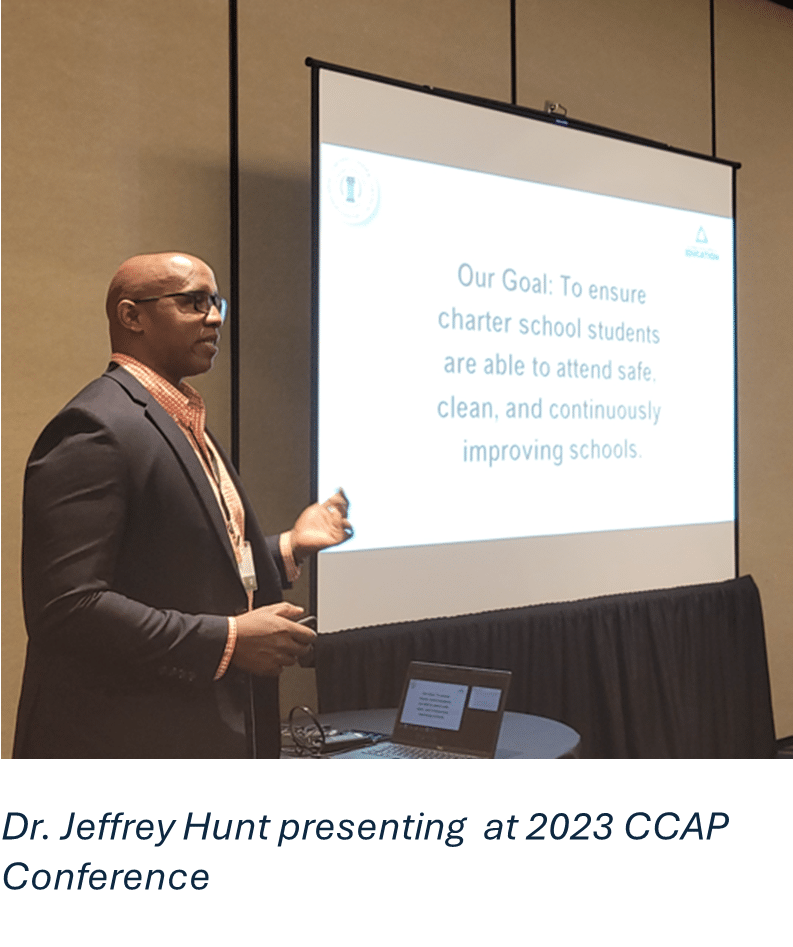 “Definitely, I plan to be back next year and plan to bring a team,” said Dr. Hunt, director of Charter Schools for the Fresno County Superintendent of Schools, which authorizes seven charter schools with a combined enrollment of about 3,400 students. Hunt said there is simply no way for one person to attend all the useful sessions on issues that run the gamut from governance and oversight to technical training and renewals.
“Definitely, I plan to be back next year and plan to bring a team,” said Dr. Hunt, director of Charter Schools for the Fresno County Superintendent of Schools, which authorizes seven charter schools with a combined enrollment of about 3,400 students. Hunt said there is simply no way for one person to attend all the useful sessions on issues that run the gamut from governance and oversight to technical training and renewals.
“What I found is that with the breakouts you wanted to clone yourself so you could be in more than one,” he reflects, adding that unlike “some conferences where you want to go hide, this was one that you really wanted to be in multiple breakouts.”
Kelly Krag-Arnold, director of the Charter School Office for Oakland Unified School District (OUSD), brought one other person from her office to the 2022 conference, and then brought two to last June’s conference. OUSD is one of the largest authorizers in California. The charter school office has six employees overseeing 28 charter schools and nearly 11,529 students.
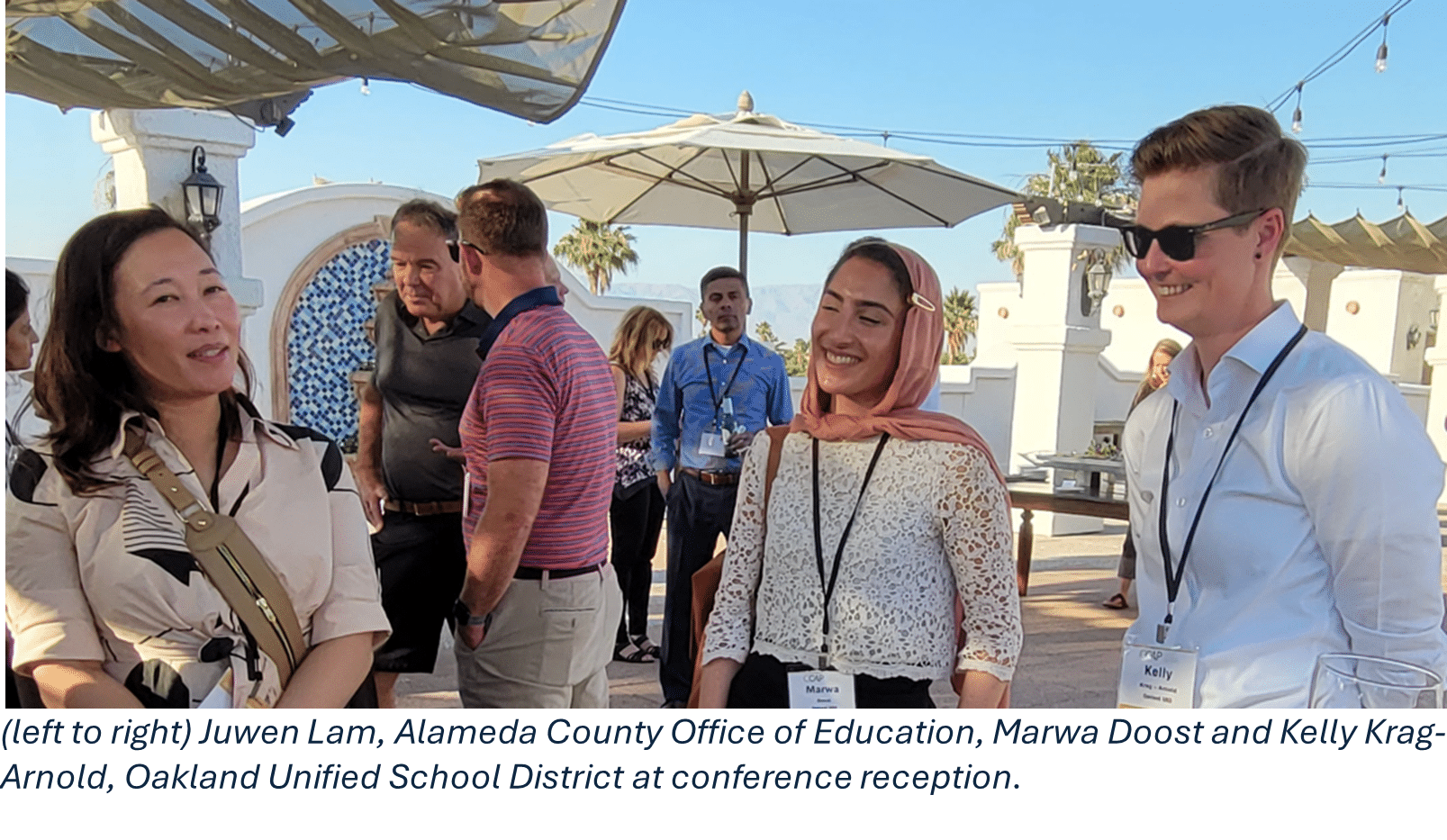
“[We] came back this year because last year was great,” especially for networking opportunities in such a niche field, Krag-Arnold said. Since there are not many people doing this work, “it’s been really helpful to just have those networks to rely on and kind of chat things through before major things come up.”
Who’s in your network?
“I came to CCAP for networking especially, that’s my first and foremost, but also just to learn from others and get some more knowledge,” said first-time conference goer Michelle (Cheli)
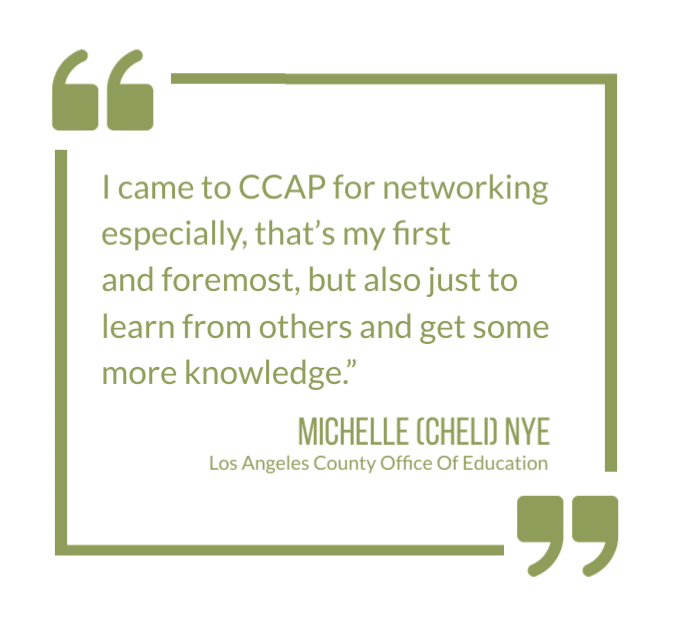
Nye, Coordinator III in the Charter School Office at the Los County Office of Education (LACOE), which oversees 25 charter schools that enroll about 7,000 students.
Even after four years in her position at the LACOE, Nye acknowledged that “I know I can always learn more.”
The conference Role-Alike sessions-dedicated time built into the agenda to connect with others doing the same job-are a favorite networking space among authorizers of all experience levels and sizes. “Today was a great example,” noted Felipe Vasquez, Coordinator in the Charter School Unit at the Orange County Department of Education, which authorizes 27 charter schools. He said the “big umbrella” that drove the conversation in his Role-Alike group was accountability and how to measure it.
“You had an opportunity to speak with other people in the same role, but more importantly, that deep rich conversation of understanding what’s ahead of us not just six months, but even a couple of years ahead of us.”
Financial oversight and fraud detection
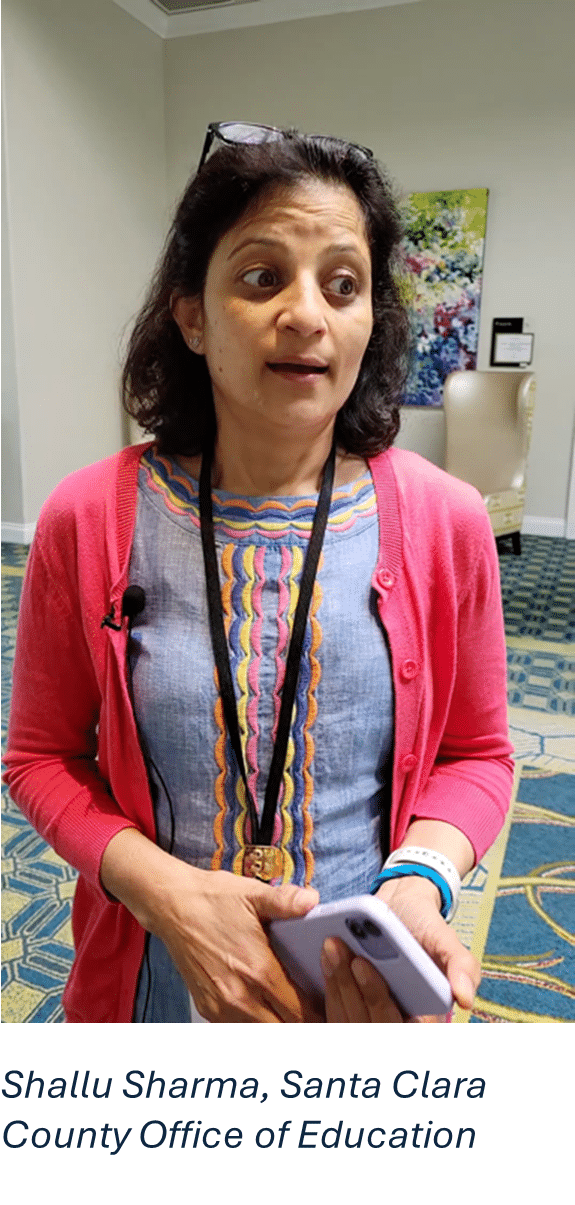
![]() Fiscal mismanagement is the primary reason that charter schools close, but fiscal oversight requires a lot of time and expertise that some authorizers do not have. CCAP’s conferences offer a number of in-depth opportunities to better understand the authorizer’s role in financial oversight.
Fiscal mismanagement is the primary reason that charter schools close, but fiscal oversight requires a lot of time and expertise that some authorizers do not have. CCAP’s conferences offer a number of in-depth opportunities to better understand the authorizer’s role in financial oversight.
To help meet this need, CCAP’s 2023 conference included three separate hands-on workshops, a Role-Alike meeting for business officials, a preconference session, and time set aside for one-on-one meetings between authorizers and experts in charter school finances.
“I do love CCAP’s toolkit” on financial health and sustainability, said Shallu Sharma, Financial Administrator in the charter schools department at the Santa Clara County Office of Education (SCCOE), which oversees 21 charters with 9,500 students.
As a partner with CCAP in the Charter Authorizer Support Initiative (CASI) run by the California Department of Education, SCCOE is experienced and effective in its approach to financial monitoring. Still, Sharma found it helpful to learn about new resources and how authorizers are handling the same situations “so they can better serve the charters and then have consistent policies across the schools.”
Octavio Castelo sees CCAP conferences and pre-conferences as an integral part of ongoing professional development. He presented at a fiscal oversight and monitoring session at the 2022 conference, and he returned last June to hear what other authorizers are doing to improve relationships with their charter schools.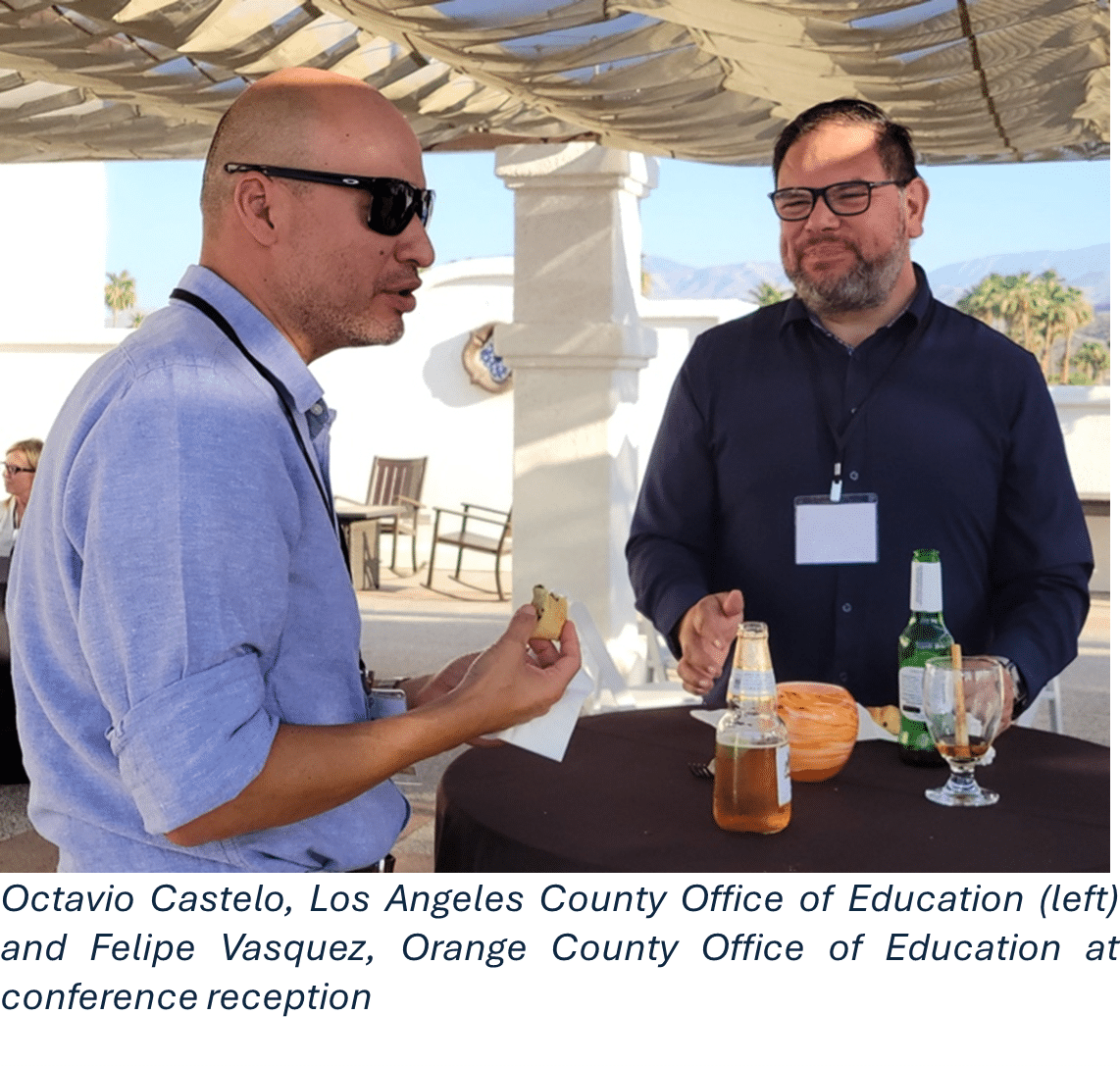
As Director of Business Advisory Services at the Los Angeles County Office of Education (LACOE), Castelo said he is particularly interested in CCAP’s new initiatives to improve detection and investigation of fraud and hoped to pick up ideas on “how to go about doing that more tactfully.”
LACOE authorizes 26 charters with about 7,000 students, but its role in investigating fraud is significantly greater. Under Assembly Bill 139, county offices of education are required to monitor the fiscal solvency of all public schools within their borders, and are authorized to audit any of those schools suspected of fraud. Los Angeles County has 2,185 schools located within 80 school districts.
Something for everyone: Small and large, new, and repeat offenders
The conference provided an expansive introduction to authorizing for Bruce Sawyer and Breean Brown, both of whom are essentially freshmen in the field.
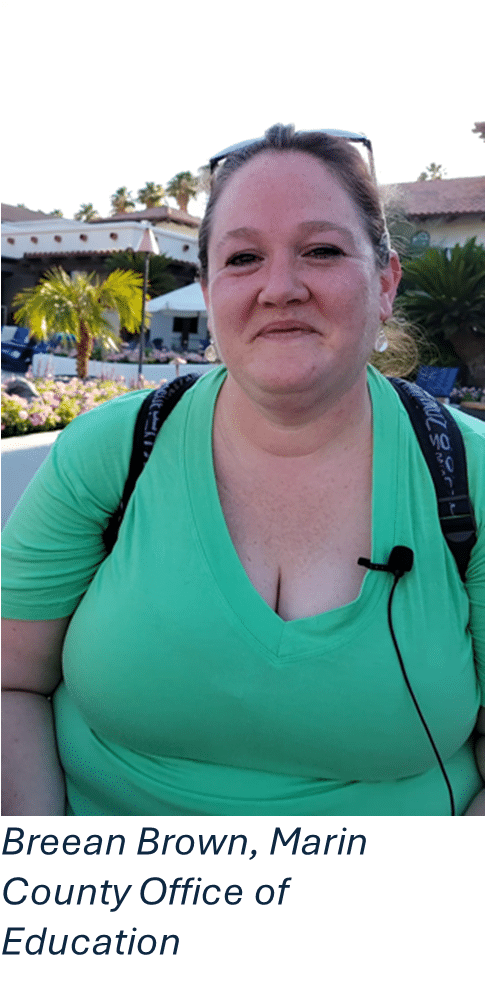
![]() “I am 100% new to charters, this is my first venture into charter land, and I learned a lot of new things and I’m very excited,” commented Brown, senior director of business services at the Marin County Office of Education, which authorizes two charters with 237 students.
“I am 100% new to charters, this is my first venture into charter land, and I learned a lot of new things and I’m very excited,” commented Brown, senior director of business services at the Marin County Office of Education, which authorizes two charters with 237 students.
Brown said her goal for the conference was to “feel confident that I have enough knowledge to do my due diligence as the oversight agency for a charter. I want to feel like I’m doing them all the justice they deserve [and] I have done everything that needs to be done.”
After years at a private school, Sawyer was preparing to transition into his first authorizing position as Coordinator of Continuous Improvement and Support for Charter Schools in the San Joaquin County Office of Education (SJCOE), which authorizes three charters that enroll 3,051 students, more than half of them at a TK-12 hybrid academy.
He found that the conference gave him a great start at understanding his new role expressed his gratitude to the experts who “have gifted me with the opportunity to pick their brain and learn from them.”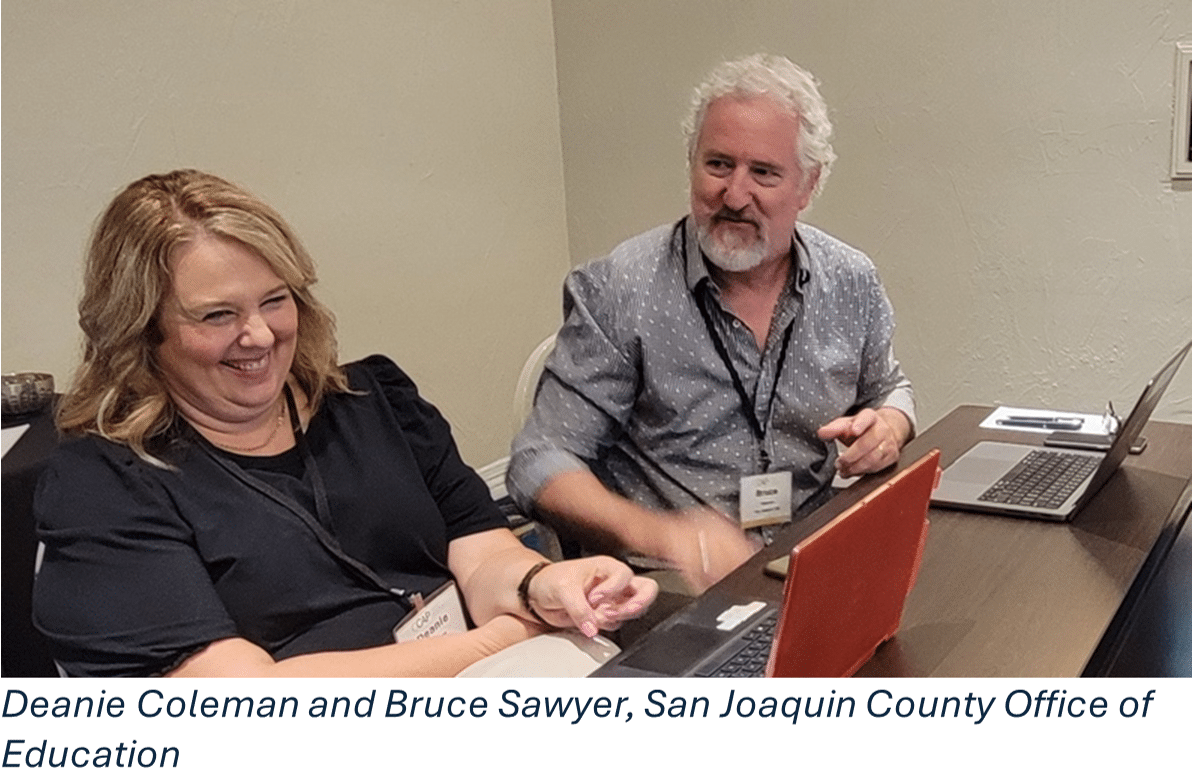
High on Sawyer’s list was brushing up on data. “What [the conference] really showed me is how much I need to learn about data; collecting and analyzing data,” he said with a nervous laugh.
Amanda Goldman came to the conference with just one Herculean goal: “I am here to figure out what my job is!,” she said with a wry smile.
When she took over as Director of Innovative Schools in the Sacramento City Unified School District in early 2023, the position had been vacant for some time. She found the first few months “very isolating,” and was thrilled to connect with new colleagues at the conference whom she could call on for ideas and information.
Nearly 60 percent of California’s charter schools are authorized by small school districts, defined as those with no more than 2,500 students. Small and rural authorizers have a unique set of challenges; often not enough staff members, resources, and time to dedicate to consistent oversight. Gateway Unified School District in Shasta County falls below the cap, with a bit more than 2,335 students.
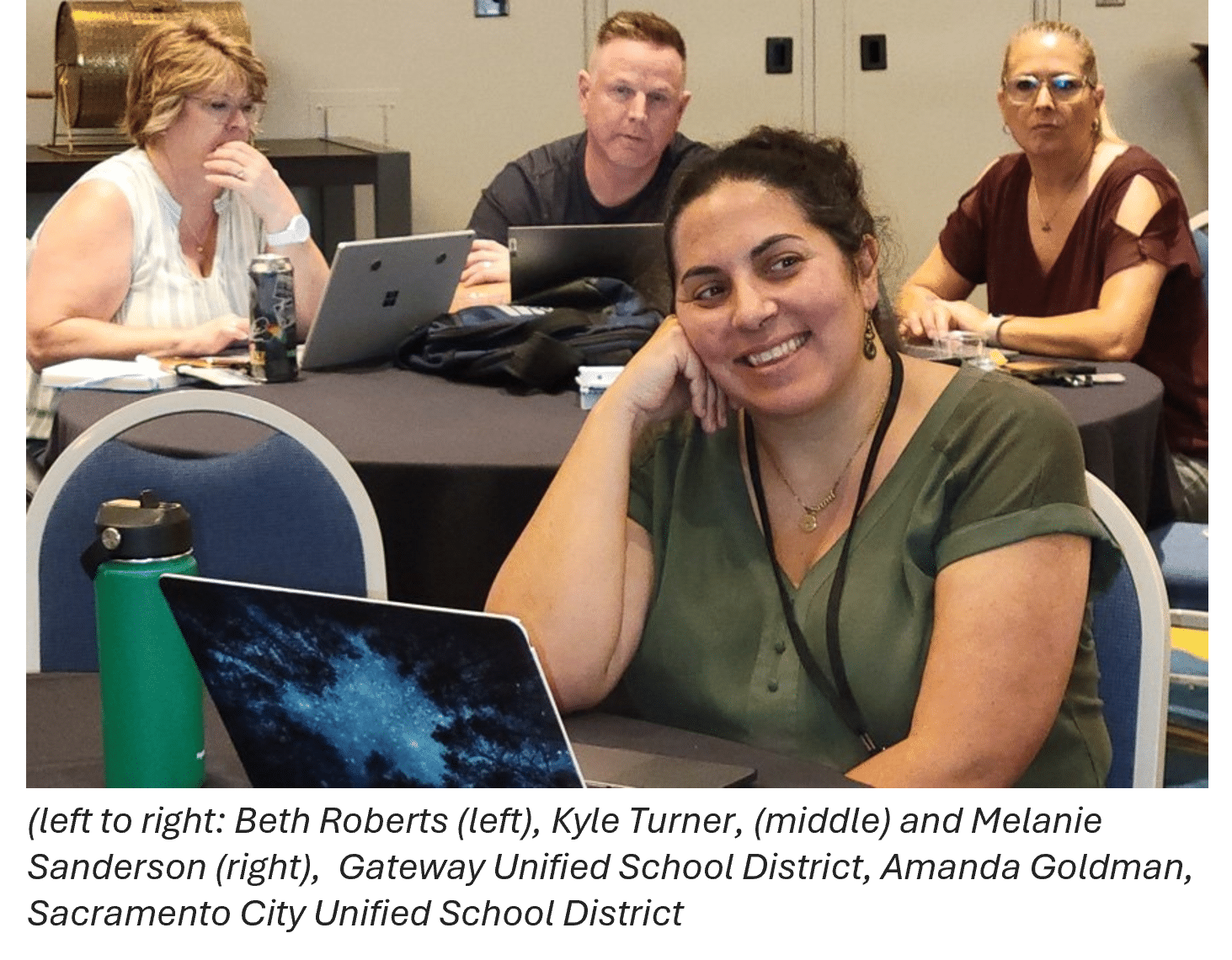 District staff are spread so thin that sometimes other pressing responsibilities take their attention away from charters schools, explained Kyle Turner, Gateway’s Superintendent. He brought two staff members with him to the conference to strengthen the district’s authorizing skills.
District staff are spread so thin that sometimes other pressing responsibilities take their attention away from charters schools, explained Kyle Turner, Gateway’s Superintendent. He brought two staff members with him to the conference to strengthen the district’s authorizing skills.
Even though Gateway has only one charter, “everybody needs to pitch in a little bit just to help support that one,” explained Beth Roberts, the district’s director of business services. Roberts attended the past two CCAP conferences and found that for small authorizers “being part of this organization is just an amazing support for all of us as we’re struggling to do our own jobs and the job of an authorizer, too.”
Verified data and preparing for the “renewal cliff”
With a year-and-a-half under his belt as program manager of the charter office in San Diego Unified School District (SDUSD), Richard Farace may have more experience than newcomers, but he said he relies on CCAP conferences and trainings to gain “another layer of learning.”
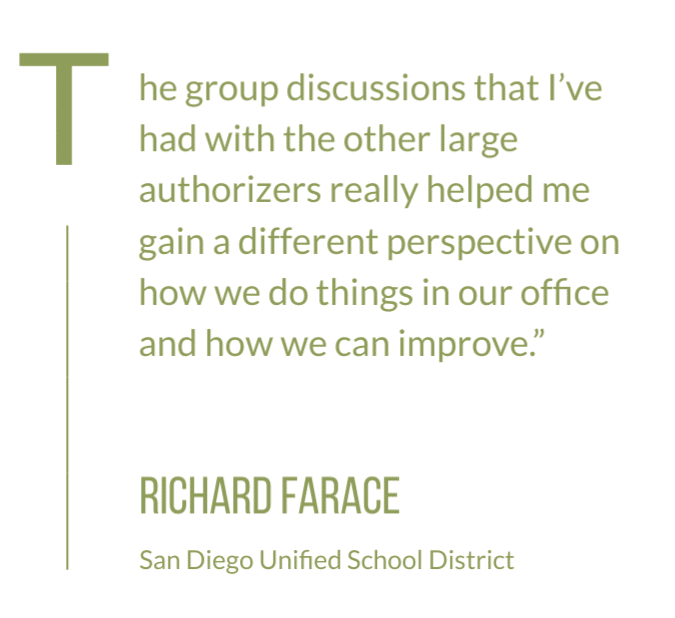
Last summer, his primary goal was to learn more about verified data, which the California Department of Education mandates as a measure of student achievement and is a key factor in renewal decisions. With the end of the state’s three-year extension on renewals enacted during the pandemic, authorizers are preparing for a surge of renewals that many are calling the “renewal cliff.” Farace estimates that about 30 of San Diego Unified’s 40 charters will up for renewal during the next couple of years.
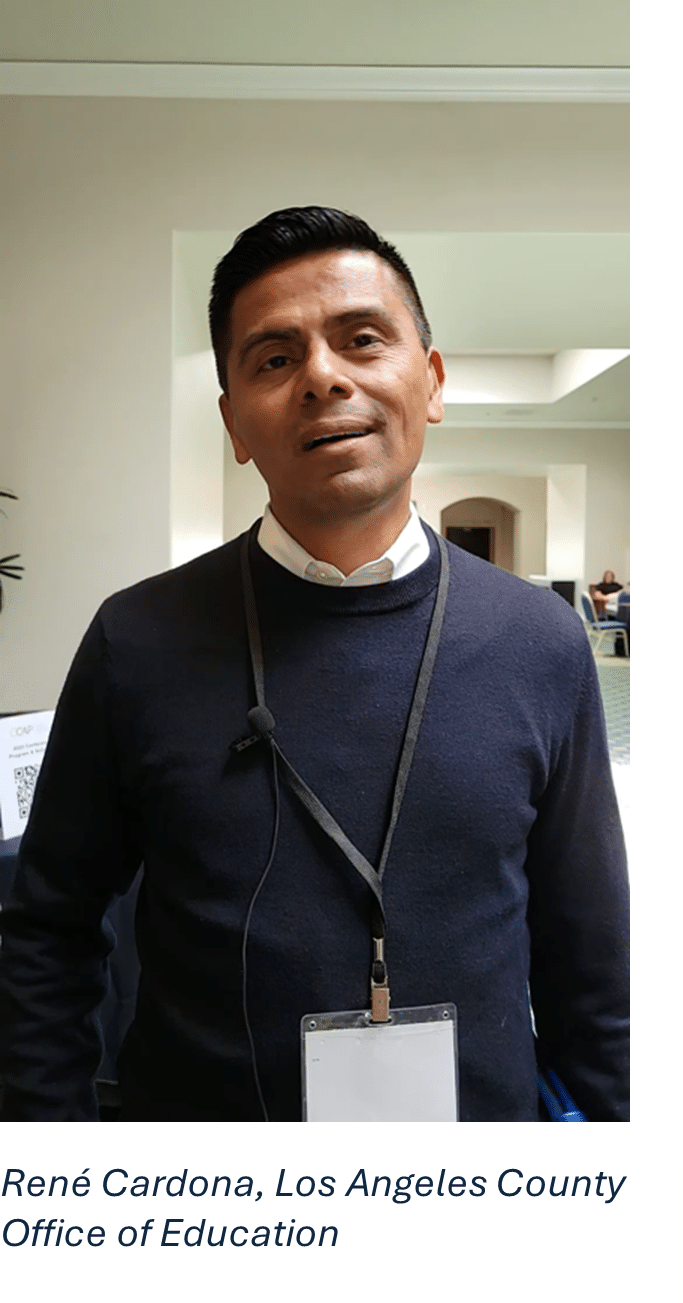
![]() A desire to understand the high stakes of verified data also drew René Cardona, a newly hired coordinator in the charter school office at LACOE to his first CCAP conference. Another key influence was LACOE’s director of charter schools, Indra Ciccarelli, a CCAP board member who serves on CCAP’s conference committee and saw the conference as an opportunity for Cardona to bond with his team members.
A desire to understand the high stakes of verified data also drew René Cardona, a newly hired coordinator in the charter school office at LACOE to his first CCAP conference. Another key influence was LACOE’s director of charter schools, Indra Ciccarelli, a CCAP board member who serves on CCAP’s conference committee and saw the conference as an opportunity for Cardona to bond with his team members.
Cardona found the data sessions comprehensive, humbling, and collegial. “Hearing the different ways that data is analyzed, how we’re all grappling with verified data, and how we’re all creating a network here to make a difference in the lives of students through charter authorizing has been really powerful,” he said.
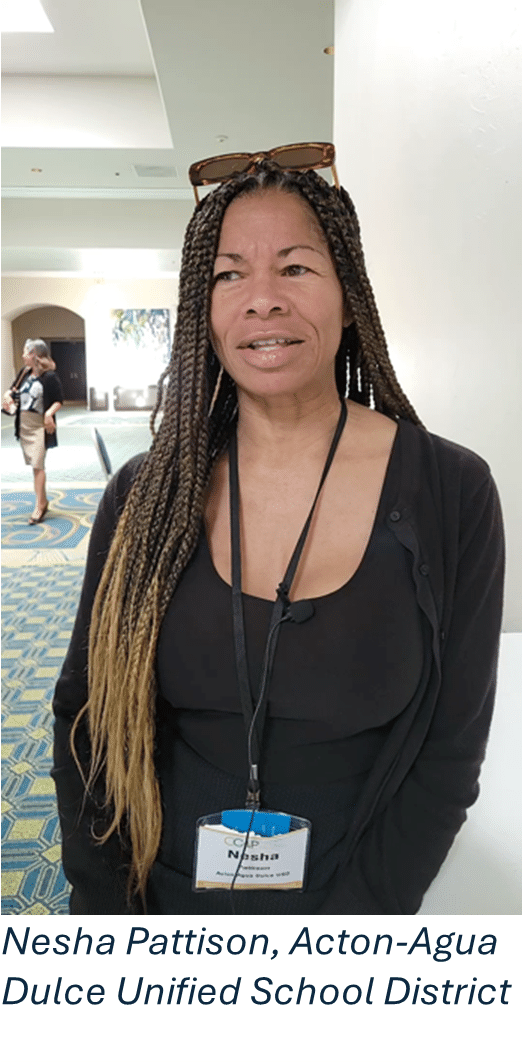
The focus on useful information and proactive initiatives that help authorizers to “make their schools more successful and [strengthen] the whole authorizing process,” is what Nesha Pattison finds so valuable about CCAP’s conferences and the monthly virtual CASI Charter Chats.
Pattison is Director of Charter Services in the Acton-Agua Dulce Unified School District, which is located about 50 miles northeast of Los Angeles, and has a strikingly different charter/traditional public school balance than most authorizers. Of nearly 10,000 students, three-quarters are enrolled in one of the district’s 11 charter schools, which are overwhelmingly non-classroom based or hybrids. The other 25 percent of students attend one of three district-run schools.
Given those substantial charter numbers, Pattison needs fast access to accurate and practical information, and she said CCAP delivers: “This, I’d have to say, is one of the conferences that I really feel [I] get workable tools from.”
